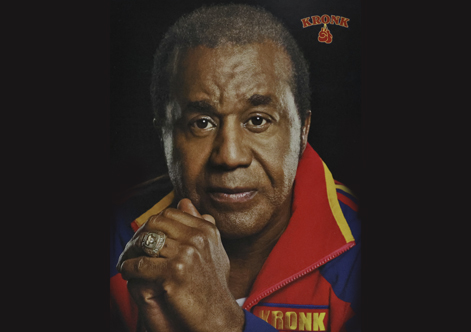|
Undoubtedly
the
crown
jewel of
KRONK
Gym,
Thomas
"Hitman"
Hearns
electrified
the
boxing
world
with his
unparalleled
power
and
unmatched
versatility.
Hearns
didn't
just win
titles;
he made
history
by
becoming
the
first
fighter
ever to
conquer
four
different
weight
classes.
His
thunderous
punches
and
relentless
drive
transformed
him into
a living
legend,
embodying
the
spirit
of KRONK
and
redefining
what it
means to
be a
champion.
(Photo
from
Kronk
Gym) |
|
|
|
|
|
 |
 |
 |
|
|
|
|
|
|
 |
|
|
Emanuel
Steward
opened
the
first
Kronk
Gym in
1971 in
a modest
building
on
Detroit's
southwest
side.
What
happened
next
changed
boxing
forever.
Hilmer
Kenty
became
Kronk's
first
professional
champion,
winning
the WBA
title
and
establishing
the
gym's
winning
culture.
(Photo
from
Kronk
Gym) |
| |
The
Return
of a
Boxing
Dynasty:
Kronk
Gym
Finds
New Life
in
Historic
Detroit
Dustin
Schoenherr
- Sports
Tell Us
Detroit
News
DETROIT
-
Detroit's
boxing
soul is
stirring
back to
life.
This
summer,
the
legendary
Kronk
Gym will
rise
again—not
from the
ashes of
its
fire-ravaged
original
home,
but in a
setting
that
makes
the
story
even
more
remarkable.
The new
Kronk
will
open
inside
the
Brewster
Wheeler
Recreation
Center,
the very
building
where
heavyweight
champion
Joe
Louis
once
trained
in the
basement
that
still
exists
today.
It's a
resurrection
thirteen
years in
the
making,
bringing
boxing's
most
storied
gym full
circle
to its
Detroit
roots.

Future
fighters
will
train
where
Louis
prepared
for his
historic
battles,
carrying
forward
a legacy
that
connects
the
Brown
Bomber
to the
Hitman.
Among
the new
boxers
associated
with
Kronk is
William
Myhre,
who has
been
training
at the
gym
since he
was 8
and is
now a
professional
prospect.
(Photo
by HB
Meeks/Tell
Us
Detroit
News)
The
Brewster
Wheeler
Recreation
Center's
survival
borders
on
miraculous.
Mayor
Mike
Duggan
revealed
this
week
that the
deteriorating
structure
was
literally
days
away
from
demolition
a decade
ago when
community
advocates
stepped
in,
recognizing
what
would be
lost
forever.
"It was
days
away
from
being
demolished,"
Duggan
told
reporters
Wednesday.
"We
ended
the
demolition
contract
and
asked
ourselves:
what
could we
do? Can
you
imagine
a more
perfect
use for
this
building
than
hosting
the
Kronk
gym?
This
exemplifies
the
Detroit
we're
building—a
city
that
honors
its
history
and
keeps it
vibrantly
alive."
The
irony is
perfect:
a
building
saved by
its
historical
significance
will now
house a
gym
being
reborn
from its
own
legendary
past. In
the
basement,
Joe
Louis's
original
training
room
remains
intact—a
shrine
to
Detroit
boxing
that
will
soon
echo
with the
sounds
of a new
generation
of
fighters.
Emanuel
Steward
opened
the
first
Kronk
Gym in
1971 in
a modest
building
on
Detroit's
southwest
side.
What
happened
next
changed
boxing
forever.
Hilmer
Kenty
became
Kronk's
first
professional
champion,
winning
the WBA
title
and
establishing
the
gym's
winning
culture.
But it
was
Thomas
"Hitman"
Hearns
who
transformed
Kronk
from
successful
gym to
boxing
mecca.
Hearns
was
poetry
in
motion—a
devastating
combination
of
surgical
precision
and
explosive
power
that
dismantled
elite
opponents
like
José
"Pipino"
Cuevas,
Wilfred
Benítez,
and
Roberto
Durán.
His
61-5-1
record
and five
world
titles
became
the
Kronk
standard.
The
gym's
reputation
spread
globally.
Future
heavyweight
champions
Lennox
Lewis
and
Wladimir
Klitschko
made
pilgrimages
to
Detroit,
seeking
Steward's
transformative
training
methods.
Kronk
wasn't
just
producing
champions—it
was
defining
what
championship
training
looked
like.
The
original
Kronk's
decline
began
with
financial
pressures
that
forced
its
closure
in 2006.
For
eleven
years,
the
empty
building
stood as
a
monument
to faded
glory.
Then, in
2017,
fire
consumed
the
structure
entirely,
seemingly
writing
the
final
chapter
of the
Kronk
story.
Steward
had
already
adapted,
moving
his
operation
to a
rented
facility
in
Dearborn
and
continuing
to
develop
young
fighters
until
colon
cancer
claimed
his life
in 2012
at age
68. His
death
left a
void in
boxing
that
many
thought
could
never be
filled.
Yet here
we are,
thirteen
years
after
the
original
gym
closed
and
twelve
years
after
Steward's
passing,
witnessing
something
extraordinary:
the
Kronk
name
returning
to
Detroit,
not as a
nostalgic
echo but
as a
living,
breathing
training
ground
for the
next
generation.
The
summer
reopening
of Kronk
Gym
represents
something
deeper
than
sports
facility
management.
It's
Detroit
declaring
that its
greatest
stories
don't
end—they
evolve.
The
gym's
resurrection
at
Brewster
Wheeler,
in the
same
building
where
Joe
Louis
trained,
creates
an
unbroken
chain of
Detroit
boxing
excellence
spanning
nearly a
century.
The
basement
where
Louis
honed
his
craft
will
again
ring
with the
sound of
heavy
bags and
rapid
footwork,
proving
that in
Detroit,
legends
don't
die—they
just
wait for
their
moment
to rise
again.
This
isn't
just the
reopening
of a
gym.
It's the
restoration
of
boxing's
most
hallowed
ground
and a
testament
to a
city
that
refuses
to let
its
greatest
stories
fade
into
history.
|
|
|
|
|
|
|
|
|